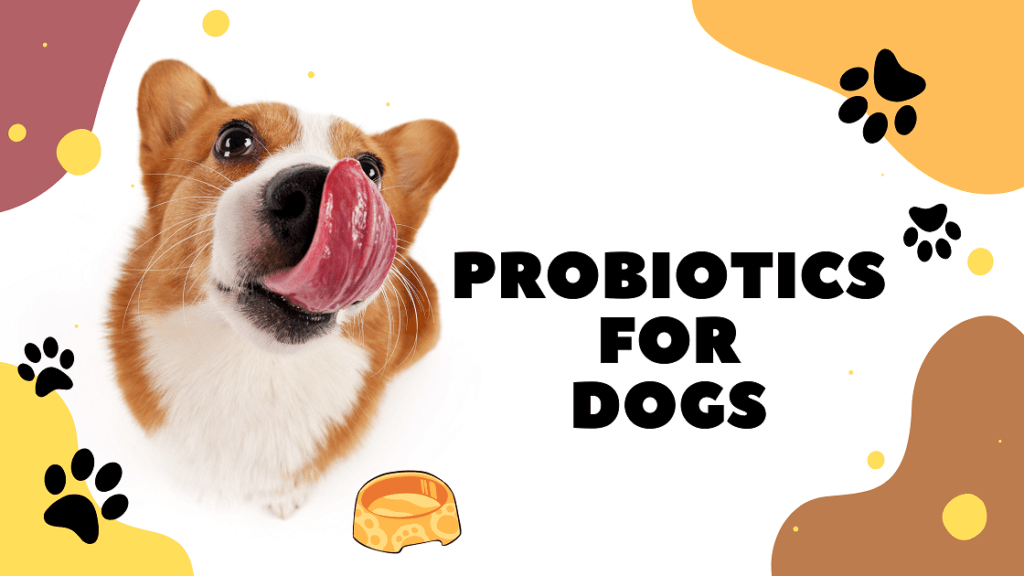
You want to keep your pet healthy and happy and would do anything to ensure that. From daily exercise, vet, and vaccinations to a healthy diet. Add to that probiotic for that additional guard against tummy troubles, it is as good for your pets as for you.
Probiotics are the healthy microbes in our dogs’ digestive systems that perform many critical tasks like absorbing nutrients and helping prevent illness by supporting the immune systems. Stress, dietary changes, or antibiotic use can disrupt this important microbial balance and lead to health issues. Dog probiotics can improve your dog’s digestion and overall health. They can also help prevent gastrointestinal disorders such as diarrhoea, constipation, and bloating.
In this post, we’ll explain what probiotics are, what they do, and some of the benefits of giving them to your pet.
What are Probiotics?
Probiotics are beneficial bacteria and yeast that are good for your health, especially your digestive system. They occur naturally in your body and are also found in some foods and supplements.
Probiotics for dogs come in many different forms, including capsules, powders, and liquids. They’re available over the counter and online, and you can even get them from your veterinarian. But do probiotics for dogs work? The answer is yes – but it’s important to do your research before purchasing them.
The healthy microbes in your dog’s gut play an important role in food digestion, vitamin production and keeping the immune system strong. Taking Probiotics helps restore the balance of these healthy microorganisms. Probiotics help fight harmful bacteria and yeast and boost the immune system.
What are the benefits of probiotics for dogs?
Probiotics are good bacteria and yeasts that are good for a healthy gut and digestive system in dogs. Probiotic supplements can help keep your dog’s intestinal tract healthy. These supplements contain live bacteria that your dog absorbs when eating the right foods. They can be found in some foods, such as yoghurt, and are also available as supplements.
Studies have shown that probiotics can help dogs with diarrhoea, constipation, and other gastrointestinal problems. They can also help promote a healthy immune system.
When to give your dog probiotics?
Dogs may be given probiotics during an illness, or after antibiotic treatment as supplements to help restore the normal balance of bacteria in the gut. If your dog is experiencing any digestive issues, you might want to consider giving him probiotics as a supplement. Talk to your veterinarian to determine which probiotic is right for your dog.
Choosing the right Probiotic for Your Dog
Probiotics can be very helpful for dogs, but it’s important to consult with your veterinarian first to see if they’re right for your pet. Not all probiotics are created equal, and some can actually be harmful if taken in high doses. So do your research and make sure you’re picking a product that’s been tested and approved for canine use.
When choosing a probiotic, look for one that contains live and active cultures, and check the number of Colony Forming Units (CFUs) to determine potency. A higher number of CFUs is usually better. Figure out the probiotic’s dosage, it can usually be found on the label or on the company’s website. Also, check out the ingredients for prebiotics, as without them probiotics are less effective and may eventually die off. Apples, bananas and asparagus are natural prebiotic foods that you can add to your dog’s bowl.
And finally, think about your dog’s individual needs. Some probiotics are specifically designed for dogs with diarrhoea or those battling allergies or skin problems. So it’s important to find a product that caters to your pup’s specific needs.
What Are the Side Effects of Probiotics for Dogs?
Before you give your dog probiotics, it’s important to understand that they shouldn’t contain artificial sweeteners. Probiotics can also interact with other medications your dog is taking, so it’s important to check with your vet before starting any supplement regimen.
You’re also going to want to ensure the one you choose contains enough strains of good bacteria to be useful. Kindly note that diarrhoea could be a common side effect that some dogs may experience, if so, you may discontinue giving your dog probiotics.
How Do I Give My Dog a Probiotic?
All right, so you’re convinced that probiotics are a good idea for your pup. But how do you go about giving them to your dog? It’s actually pretty simple.
Probiotics come in the form of yoghurt, kombucha, and fermented vegetables. You can also buy them in supplement form. If you’re not sure where to start, try incorporating some of these probiotic-rich foods into your dog’s food. There are multiple health benefits of probiotics and probiotic strains for a healthy dog to support her overall health.
There are several kinds of probiotic forms that are ingested differently. Powders and liquids can be mixed with food, capsules can either be opened and mixed with food or fed whole, and soft, flavoured chews can be taken as regular dog treats.
Can dogs take human probiotics?
The daily probiotic recommendations are based on weight hence specialized canine probiotics containing milder doses are a better fit for dogs.
If you’re considering giving your dog probiotics, talk to your veterinarian to make sure you’re giving them the right product and dosage.

2 month Indie puppies at kilpauk chennai. one male one female both active healthy curious intelligent playful for adoption. they appear to be Labrador cross. Need kind home urgently. up for adoption. 9444628029 Raj whatsapp for photos